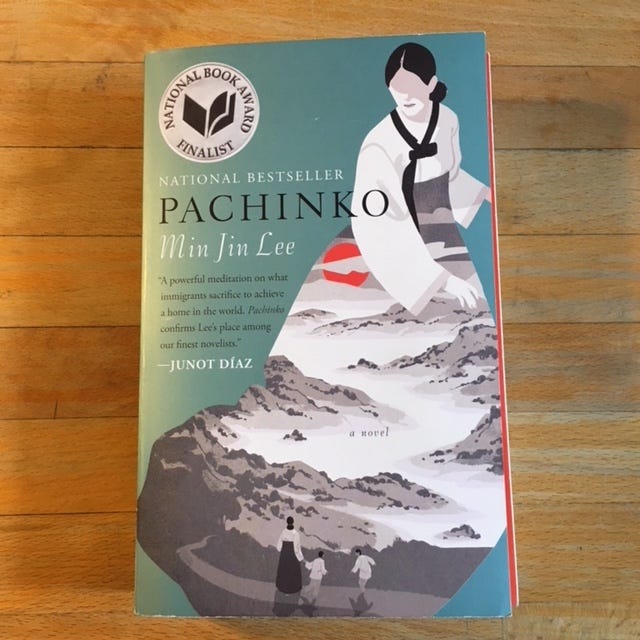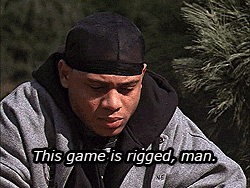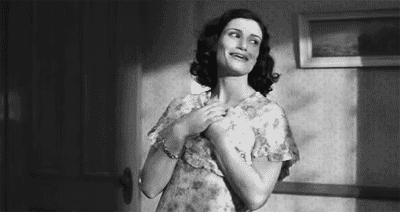Hello!
Welcome to the latest edition of Books on GIF, the fun and smart alternative to boring book reviews. This Sunday's book is 'Pachinko' by Min Jin Lee.

This novel is so good! SO GOOD. I loved it like this guy loves Five Guys:
 Some of you may remember that I listed this book in my poll about what to review first in 2018. Elena Ferrante's 'Those Who Leave and Those Who Stay' was what you chose, beating 'Pachinko' by one vote. It took me this long to finally read Min Jin Lee's book because I thought it would take longer than a week to finish. But I got tired of passing it over week after week, and my inner voice said:
Some of you may remember that I listed this book in my poll about what to review first in 2018. Elena Ferrante's 'Those Who Leave and Those Who Stay' was what you chose, beating 'Pachinko' by one vote. It took me this long to finally read Min Jin Lee's book because I thought it would take longer than a week to finish. But I got tired of passing it over week after week, and my inner voice said:
 So I did. I needn't have worried because 'Pachinko' is a beautiful and riveting book, and I flew through it. It's an epic and heartbreaking story that covers four generations of a Korean family forced to emigrate to Japan. Over the decades, we see them struggle to provide a better life for themselves and future generations amid colonization, war and relentless bigotry. I don't want to give too much of the story away, because I think you'll enjoy and appreciate it more if you come into it cold. But here's a quick overview. The main character is Sunja, the daughter of a woman who runs a small boardinghouse in a fishing village near Busan, Korea. As a teenager, Sunja falls in love with an older man named Hansu. She gets pregnant, and Hansu reveals he cannot marry her because he has a wife and three daughters who live in Japan, but he vows to provide for her and the child. He's got a ton of money because he's a yakuza gangster. She rejects the offer, but is in a real jam. The pregnancy threatens not only to disgrace Sunja, but also to ruin her mother's boardinghouse business. A Christian missionary named Baek Isak, who while on his way to Osaka had been forced to stay at the boardinghouse to recuperate from tuberculosis, offers to marry Sunja, claim the child as his and take her with him to Japan, thus saving her family from shame. In Osaka, the couple move in with Isak's brother Yoseb and his wife, Kyunghee. From there, as the story progresses, it shifts focus to Sunja's sons, Noa and Mozasu, and eventually to her grandson, Solomon, like:
So I did. I needn't have worried because 'Pachinko' is a beautiful and riveting book, and I flew through it. It's an epic and heartbreaking story that covers four generations of a Korean family forced to emigrate to Japan. Over the decades, we see them struggle to provide a better life for themselves and future generations amid colonization, war and relentless bigotry. I don't want to give too much of the story away, because I think you'll enjoy and appreciate it more if you come into it cold. But here's a quick overview. The main character is Sunja, the daughter of a woman who runs a small boardinghouse in a fishing village near Busan, Korea. As a teenager, Sunja falls in love with an older man named Hansu. She gets pregnant, and Hansu reveals he cannot marry her because he has a wife and three daughters who live in Japan, but he vows to provide for her and the child. He's got a ton of money because he's a yakuza gangster. She rejects the offer, but is in a real jam. The pregnancy threatens not only to disgrace Sunja, but also to ruin her mother's boardinghouse business. A Christian missionary named Baek Isak, who while on his way to Osaka had been forced to stay at the boardinghouse to recuperate from tuberculosis, offers to marry Sunja, claim the child as his and take her with him to Japan, thus saving her family from shame. In Osaka, the couple move in with Isak's brother Yoseb and his wife, Kyunghee. From there, as the story progresses, it shifts focus to Sunja's sons, Noa and Mozasu, and eventually to her grandson, Solomon, like:
 Along the way, the family is forced to break from traditions in order to survive. Yoseb, who works in a Japanese factory, is dead set against Sunja and Kyunghee paying off his debts or working outside of the home, because it's a man's job to provide for the family and a woman's job to stay home. The women try to appease Yoseb, but they nevertheless start a successful kimchi and candy business that provide for the family's survival after Yoseb is horribly burned following the atomic blast at Nagasaki. As he suffers a long and slow death that lasts decades, so too do the old ways deteriorate. I really like how Lee captures that transition over the length of the story. And I also really like how she makes you care about the characters. When one of them commits suicide, I experienced a genuine pang of grief that I'd not felt since Estraven's death in 'The Left Hand of Darkness.' I was like:
Along the way, the family is forced to break from traditions in order to survive. Yoseb, who works in a Japanese factory, is dead set against Sunja and Kyunghee paying off his debts or working outside of the home, because it's a man's job to provide for the family and a woman's job to stay home. The women try to appease Yoseb, but they nevertheless start a successful kimchi and candy business that provide for the family's survival after Yoseb is horribly burned following the atomic blast at Nagasaki. As he suffers a long and slow death that lasts decades, so too do the old ways deteriorate. I really like how Lee captures that transition over the length of the story. And I also really like how she makes you care about the characters. When one of them commits suicide, I experienced a genuine pang of grief that I'd not felt since Estraven's death in 'The Left Hand of Darkness.' I was like:  Sunja's sons eventually go into the business of pachinko, which I learned from the internet is a gambling game big in Japan that's half pinball and half slot machine. Here's Bart Simpson playing it:
Sunja's sons eventually go into the business of pachinko, which I learned from the internet is a gambling game big in Japan that's half pinball and half slot machine. Here's Bart Simpson playing it:
 The owners of pachinko parlors subtly rig the games each day to give players just a taste of success without actually winning. Life 'was like this game,' the book says, and that's as true in the book's Japan as it is in the United States. For many people, particularly immigrants and people of color here:
The owners of pachinko parlors subtly rig the games each day to give players just a taste of success without actually winning. Life 'was like this game,' the book says, and that's as true in the book's Japan as it is in the United States. For many people, particularly immigrants and people of color here:
 I learned a lot from 'Pachinko,' particularly about the brutal treatment of Koreans within Japan and how that parallels many immigrant experiences here in America. It also made me think about what my great-grandparents endured when they were immigrants. Family lore was they 'Americanized' and turned away from their Italian language and culture because America was so great and they wanted be a part of it. When I first heard that, I accepted it at face value and didn't think much else about it. After reading 'Pachinko,' where one of the characters decides he no longer wants to be Korean and tries to pass himself off as Japanese because he was tired of being made to feel ashamed of his heritage, I realized that my family's story is probably apocryphal. It struck me that maybe they, too, wanted to eliminate their past because they were made to feel ashamed of who they were and where they came from. So while 'Pachinko' is not a book about America, it is an American story. It asks the American reader, what does it actually mean to be American? Is it truly embracing all cultures and people? Or is it taking your turn to step on the neck of immigrants who came after you to get high enough to see a better future? That's ugly and awful, and if you care about making a better America, you should read this book.
I learned a lot from 'Pachinko,' particularly about the brutal treatment of Koreans within Japan and how that parallels many immigrant experiences here in America. It also made me think about what my great-grandparents endured when they were immigrants. Family lore was they 'Americanized' and turned away from their Italian language and culture because America was so great and they wanted be a part of it. When I first heard that, I accepted it at face value and didn't think much else about it. After reading 'Pachinko,' where one of the characters decides he no longer wants to be Korean and tries to pass himself off as Japanese because he was tired of being made to feel ashamed of his heritage, I realized that my family's story is probably apocryphal. It struck me that maybe they, too, wanted to eliminate their past because they were made to feel ashamed of who they were and where they came from. So while 'Pachinko' is not a book about America, it is an American story. It asks the American reader, what does it actually mean to be American? Is it truly embracing all cultures and people? Or is it taking your turn to step on the neck of immigrants who came after you to get high enough to see a better future? That's ugly and awful, and if you care about making a better America, you should read this book.
My rating:

'Pachinko' by Min Jin Lee was published in hardcover in 2017 and in paperback in 2018 by Grand Central Publishing. 479 pages.
** If you enjoyed this newsletter, please share Books on GIF with a friend. **
Next Sunday, and the Sundays after that: I'm currently reading 'Swing Time' by Zadie Smith, and hope to have it finished by next week. Also in the queue are 'The Good Earth' by Pearl S. Buck and 'Little Reunions' by Eileen Chang. Got a bestseller, a classic or a forgotten gem you want me to review? Shoot me an email.
If you missed last week's edition, here's my review of 'BUtterfield 8' by John O'Hara.
Want to discuss further this or any other book? Hit me up on Twitter, Facebook, Instagram and Goodreads.
Thanks for reading, and thanks especially to Donna for editing this review!
Until next time,
 MPV
MPV












